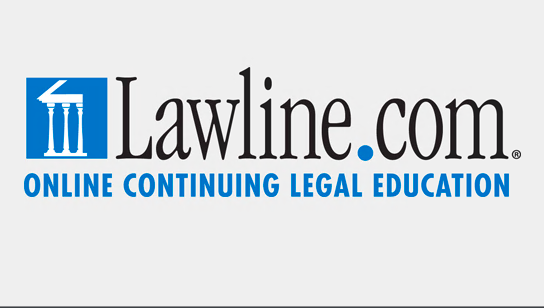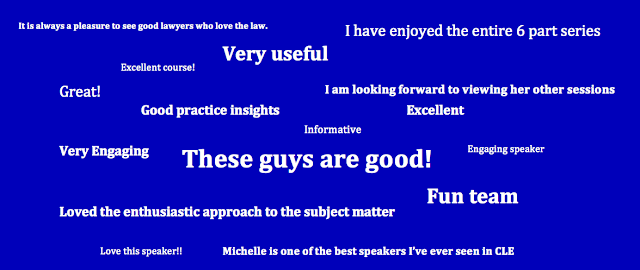The Praise Keeps Pouring in for Michelle Itkowitz’s Lawline Landlord & Tenant Litigation CLE Series!
Michelle Maratto Itkowitz, with some generous help from Jay B. Itkowitz, presented an eight-hour, seven-part Continuing Legal Education Curriculum for Lawline – New York Landlord and Tenant Litigation. The shows took a year to prepare and record and are available on Lawline.com.
Each of the seven sessions stands alone as a CLE class. The series can also be watched sequentially. Each session comes with a book, which is designed to be a resource that you keep after the presentation.
The Sessions break down as follows:
Session 1: Introduction to Landlord and Tenant Litigation and Getting a Case Started (60 minutes)
In Session One the student is introduced to the landlord and tenant field and taken step by step through the beginning stages of a case. Landlord and tenant cases are often won (or lost) before the case is even filed. A myriad of legal and factual issues need to be examined, understood, and dealt with in order to bring a winnable case on behalf of a landlord. If you are representing tenants, this is the class where you will learn about some great defenses.
At the conclusion of this session, the student will be able to:
• Understand the core legal concepts underlying landlord and tenant law
• Identify and define various occupancy relationships – such as what is a tenant at sufferance and what is a licensee
• Recognize the differences between a summary proceeding and regular plenary lawsuits
• Distinguish a nonpayment proceeding from a holdover proceeding and understand when each should be employed
• Analyze vital preliminary issues and material in a landlord and tenant matter in order to bring a successful case, including the petitioner’s interest, the lease, the multiple dwelling registration, DHCR records, an arrears report, and many other items
• Draft a defensible predicate notice, including a rent demand, a notice to cure default, or a termination notice
Session 2: Landlord and Tenant Litigation — In the Courtroom (60 minutes)
In Session Two, the student will learn to initiate Summary Proceedings for the Recovery of Real Property pursuant to the Real Property Actions and Proceedings Law, and will learn how to successfully prosecute (or defend) the case through motion practice and trial. In this session, we will also cover how to think strategically about these cases and employ gamesmanship to obtain desired objectives.
At the conclusion of this session, the student will be able to:
• Initiate summary proceeding
• Supervise and effectuate valid service of process pursuant to the Real Property Actions and Proceedings Law
• Employ strategy and gamesmanship to achieve desired results
• Conduct motion practice
• Successfully try a landlord and tenant proceeding
Session 3: Landlord and Tenant Litigation: The End Game — Bringing the Case to a Satisfying Conclusion (60 minutes)
In Session Three, we explore the things that come toward the end of a landlord and tenant matter, although last does not make these important issues least. We will be exploring the many routine and specialized clauses of a stipulation of settlement, the intricate details that surround an eviction, how to make a motion for attorney’s fees, and the appellate process, including stays pending appeal.
At the conclusion of this session, the student will be able to:
• Negotiate and prepare robust stipulations of settlement
• Prepare for and supervise a successful eviction day (or prevent one)
• Make a successful motion for attorney’s fees (for either landlord or tenant)
• Understand the role of and how to obtain a stay pending appeal
• Understand the basics of the landlord and tenant appellate process
Session 4: Residential Landlord and Tenant Law – Special Issues (60 minutes)
Residential landlord and tenant law is, in many ways, a more difficult area of law than commercial landlord and tenant law. This is so because many of the provisions of a residential lease are, essentially, meaningless. A lease, for example, might say that a residential tenant is prohibited from subletting, but that is simply not the case. We approach this session from the point of view of myth-busting, and track a standard residential lease and point out all the rights that a residential tenant actually has and that a landlord of a residential premises must respect and be mindful of.
At the conclusion of this session, the student will be able to:
• Understand the warranty of habitability and the special proceeding that a tenant can bring to force a landlord to effectuate repairs
• Understand what a residential tenant’s rights are with respect to subletting and roommates, no matter what a lease might say
• Understand a tenant’s rights with respect to AirB&B issues
• Understand the reciprocal nature of an attorneys fee clause in a residential lease
• Understand basic issues involving security deposits, guarantees, and counterclaims in the residential context
Session 5: Rent Stabilization – Special Issues (120 minutes)
This is one of our most sought-after sessions! Rent Stabilization is one of the most misunderstood areas of real property law. In this session we begin by answering the fundamental question of – How do I know if a tenant is Rent Stabilized (or not)? Then the session takes us through the most common possibilities for evicting a Rent Stabilized Tenant. As always, those defending such tenants will find a wealth of information here as well.
At the conclusion of this session, the student will be able to:
• Know whether a tenancy is Rent Stabilized (or not)
• Understand what Rent Stabilization means
• Bring or defend a Non-Primary Residence Case
• Bring or defend an Owner Occupancy Case
• Bring or defend a Demolition Eviction Case
• Bring or defend a Chronic Non-Payment of Rent Case
• Understand the ins and outs of Tenant Buy-Outs
Session 6: Commercial Landlord and Tenant Law – Special Issues (60 minutes)
Commercial landlord and tenant law is sophisticated commercial litigation and needs to be approached as such. In this session, we examine the many commonly litigated issues in commercial landlord and tenant law, delving into the many subtleties that make the area particularly challenging.
At the conclusion of this session, the student will be able to:
• Understand the difference between actual and constructive eviction
• Understand issues surrounding sublet clauses in commercial leases
• Understand the issues associated with the concept of surrender
• Understand a no waiver clause and the effect of oral agreements
• Understand the sensitive issues surrounding use clauses in commercial leases
• Understand conditional limitations in a commercial lease
• Draft a notice to cure lease default and a notice of termination of lease
• Prosecute or defend a Yellowstone injunction
• Understand the special and evolving issues surrounding non-curable lease defaults and defaults that a tenant refuses to cure
• Understand the bankruptcy implications of commercial landlord and tenant law
This Session explains the special procedures and considerations surrounding post-foreclosure evictions and Loft Law evictions. This is advanced material, designed for practitioners who are already familiar with the material covered in the above-mentioned sessions
Almost 16,000 people have watched Jay and Michelle teach CLE for Lawline over the years. People email Jay and Michelle all the time and say that they loved the shows and held on to the material for later reference. They have been asked more than once – Why do you give your secrets away?







